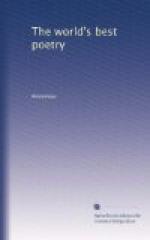Then a man shall work and bethink him,
and rejoice in the deeds of
his hand;
Nor yet come home in the even
too faint and weary to stand.
Men in that time a-coming
shall work and have no fear
For to-morrow’s lack of earning,
and the hunger-Wolf anear.
I tell you this for a wonder,
that no man then shall be
glad
Of his fellow’s fall and mishap,
to snatch at the work he had.
For that which the worker winneth
shall then be his indeed,
Nor shall half be reaped for nothing
by him that sowed no seed.
Oh, strange new wonderful justice!
But for whom shall we gather
the gain?
For ourselves and for each of our fellows,
and no hand shall labor in
vain.
Then all Mine and all Thine shall be Ours,
and no more shall any man
crave
For riches that serve for nothing
but to fetter a friend for
a slave.
And what wealth then shall be left us,
when none shall gather gold
To buy his friend in the market,
and pinch and pine the sold?
Nay, what save the lovely city,
and the little house on the
hill,
And the wastes and the woodland beauty,
and the happy fields we till;
And the homes of ancient stories,
the tombs of the mighty dead;
And the wise men seeking out marvels,
and the poet’s teeming
head;
And the painter’s hand of wonder,
and the marvellous fiddle-bow,
And the banded choirs of music:
all those that do and know.
For all these shall be ours and all men’s;
nor shall any lack a share
Of the toil and the gain of living,
in the days when the world
grows fair.
Ah! such are the days that shall be!
But what are the deeds of
to-day,
In the days of the years we dwell in,
that wear our lives away?
Why, then, and for what are we waiting?
There are three words to speak:
We will it, and what is the foeman
but the dream-strong wakened
and weak?
Oh, why and for what are we waiting,
while our brothers droop and
die,
And on every wind of the heavens
a wasted life goes by?
How long shall they reproach us,
where crowd on crowd they
dwell,—
Poor ghosts of the wicked city,
the gold-crushed hungry hell?
Through squalid life they labored,
in sordid grief they died,—
Those sons of a mighty mother,
those props of England’s
pride.
They are gone; there is none can undo
it,
nor save our souls from the
curse:
But many a million cometh,
and shall they be better or
worse?
It is we must answer and hasten,
and open wide the door
For the rich man’s hurrying terror,
and the slow-foot hope of
the poor.




